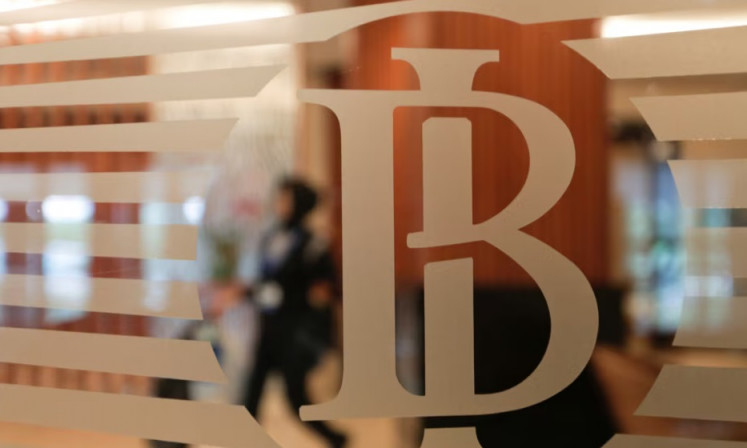Popular Reads
Top Results
Can't find what you're looking for?
View all search resultsPopular Reads
Top Results
Can't find what you're looking for?
View all search resultsRussia competes for greater RI influence
Russia and Indonesia have forged stronger ties through trade and defense cooperation 60 years after their first diplomatic contact, rivaling ties with other major powers vying for influence in Southeast Asia’s largest economy
Change text size
Gift Premium Articles
to Anyone
R
ussia and Indonesia have forged stronger ties through trade and defense cooperation 60 years after their first diplomatic contact, rivaling ties with other major powers vying for influence in Southeast Asia’s largest economy.
The two nation’s relationship, once sour during the New Order era, has strengthened, making the former communist country one of most important trade partners, with whom Jakarta signed its first bilateral strategic partnership.
“Russia is an important partner for Indonesia,” the Foreign Ministry’s director general for American and European affairs Retno L. P. Marsudi told The Jakarta Post on Tuesday.
“We established the ‘Frame of Friendly and Partnership Relations in the 21st century’ with Russia in 2003. This is our first strategic partnership with another country”.
Retno said bilateral trade between Indonesia and Russia reached US$1.6 billion in 2008, surpassing the target of $1 billion set in 2007 during the visit of then president Vladimir Putin to Jakarta. The number of Russian tourists to Indonesia stood at 69,000 in 2008 with most of them staying for an extended period in the country, helping boost the local economy.
“Indonesia has strong leverage on the world’s political stage now, no wonder it attracts the attention of major global powers,” said Retno.
Jakarta has attracted the attention of China, the United States and Japan in the last few years. It has added to its global standing by becoming a member of the G20 or world’s 20 biggest economies.
Analysts have said Indonesia’s positive growth during last year’s global economic crisis not only proved that the country has resilient economy and a huge market, it also increased its leverage as a major democracy in the world and its potential of becoming a diplomatic bridge to the Muslim world.
“We seek to develop stronger relations with countries around the world. We will build strong relations with ASEAN members as
well as any other countries,” said Retno, referring to the 10 member grouping in Southeast Asia that has remains the cornerstone of Jakarta’s foreign policy.
Indonesia has signed strategic partnerships with China, Japan, South Korea, Brazil and the European Union and will sign a comprehensive partnership with the US this March during US President Barack Obama’s visit to Jakarta.
“Indonesia and Russia’s bilateral relations have grown very strong as Jakarta sees the importance of not relying on one major power,” former ambassador to Russia Susanto Pudjomartono told the Post.
China and Russia grew closer to Indonesia in the early 1990s at the end of Cold War, undermining the influence of the US and European countries, who had at that time strained relations with Jakarta with arms embargos and concerns of human rights.
Along with the improvement of its human rights records and the urgency of fighting terrorism, Washington has restored its defense relations with Jakarta by waiving the arms embargo in 2005.
However, Indonesia has never since purchased military hardware from the United States, turning
instead to the Kremlin with whom it has already established good defense ties to renew its aging arsenal, especially those of the Navy and Air Force. There additional Russian Sukhoi fighter jets, purchased by Jakarta, will be delivered this October.
“Our current defense ties with Russia is the result of our good relations with them through the 1990s, when the financial crisis started to take toll,” said Evan A. Laksmana, a researcher with the Centre for Strategic and International Studies.
“Unlike other countries, especially the US, Russia offered us a very flexible payment scheme... and they also have no any strings attached in the purchases we made. Russia does not put pressure on our domestic policies related to the military purchases. They uphold principles of non-interference, which is very attractive to us.”
Evan said Indonesia’s and Russia’s relationship would not concern the US as much as it would to the Indonesia-China relations, which Washington has paid cautious attention to.
“American interests are tied more closely to China’s growing influence in the region rather than Russia’s influence because of [Jakarta’s] geographical proximity and political closeness to [Beijing],” he said.
Russian Ambassador to Indonesia Alexander A. Ivanov said Indonesia would remain one of the most important countries to Russia as attested by the extensive cooperation between both countries, from energy, telecommunications and education to interfaith-dialogues.
“We have had very diverse and good relations with Indonesia since the start of our diplomatic relations. In the 1950s and 1960s, the Soviet Union provided assistance in building the defense capabilities of the newly independent Indonesia,” he said.
“Implementation of our cooperation commitments that reach a wide range of areas has grown significantly since the visits of President Susilo Bambang Yudhoyono to Moscow in 2006 and [then] president Vladimir Putin to Jakarta in 2007,” said Ivanov.










